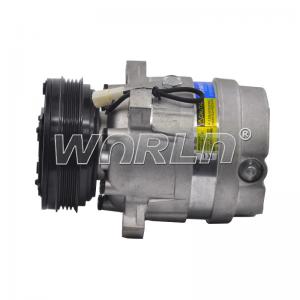

Add to Cart
V5 4PK Car Air Condition Compressor Compressor For Kia pride
WXKA046
Your car's air conditioning compressor pumps refrigerant to provide
cool, comfortable air to your vehicle. Without refrigerant
circulating, your car won't be able to cool the interior, causing
the air conditioning system to produce only warm air.
Parameter:
Model Number | WXKA046 |
Type | Air conditioner compressor |
Car Model | For Kia Pride |
Compressor model | V5 |
Grooves | 4PK |
OE.NO | N/A |
Working Principle
The basic working principle of the automobile air conditioning
compressor is to suck low-pressure cold gas (usually refrigerant)
into the compressor cavity through the driving device, and then
compress it into high-pressure and high-temperature gas.
Compressors usually use piston or screw compressors. In a piston
compressor, the piston moves up and down in the cavity, and the
cold gas is compressed by the movement of the piston. In a screw
compressor, the screw compresses the cold gas. The compression
process of the compressor increases the pressure and temperature of
the cold gas. The high-pressure and high-temperature gas will then
enter the condenser and be converted into high-pressure hot gas
through heat dissipation, then cool and expand through the
expansion valve, and finally enter the evaporator to prepare for
circulation again. Throughout the process, the compressor provides
compression and conversion capabilities and is one of the key
components to realize the automotive air conditioning refrigeration
cycle.
Find Problem
1.Inspect air flow problems: If you're experiencing insufficient air
flow from your vents, ensure that there are no blockages. Your
cabin air filter might be dirty or completely obstructed. While the
engine air filter is well-known, the cabin air filter can also
impede air flow. Another potential cause is a malfunctioning blower
motor. Before jumping to replace the AC compressors, always check
the fuse box for air flow issues.
2.Conduct a comprehensive check: If you're unsure about the problem
with your AC system, perform a thorough inspection. This is a
cost-effective method that could save you money in the long term.
Start by turning on your car's AC and eliminate any other
distracting noises. Listen for any abnormal sounds from behind the
console panel or within the engine. Additionally, assess the
cooling efficiency of the AC. Look out for unusual odors as well,
as they could indicate faulty components or blown fuses. Therefore,
it's important to inspect the fuses too.
3.Monitor your AC's temperature: Similar to measuring internal body
temperature with a thermometer during a fever, diagnosing potential
issues with your car's AC compressor requires checking its
temperature. Specifically, pay attention to the AC compressor
clutch. While the AC is running, locate the compressor and identify
the clutch, which appears as a small circular gear responsible for
engaging the compressor belt. If the AC compressor clutch remains
still despite the AC running, it indicates a problem with the
compressor. You can try adjusting the belt tension or opt for a
complete replacement of the AC compressor.
4.Detect refrigerant leaks: Just like a closed brake system in your
car, any leaks in the AC system can have a detrimental impact. This
can result in temperature fluctuations or even complete failure of
the system. Although refrigerant leaks can sometimes be caused by a
faulty AC compressor, it is not always the case. AC compressors,
like any other car part, can eventually fail. While some are
manufactured with the highest quality standards and rarely require
replacement, most AC compressors will eventually fail.
warning sign
1.The Compressor Isn't Activating: If your car's AC system is not
producing cold air when it is turned on, the compressor may be the
issue. To check if power is reaching the compressor, use a
multi-meter. If no power is reaching the compressor, it is
recommended to take your car to a mechanic or an auto electrician
for further diagnosis and repair.
2.Warm Air Instead of Cold Air: Another common indication of a
failing AC compressor is when the air conditioner starts blowing
warm air instead of cold air. This could be due to a refrigerant
leak or insufficient refrigerant gas levels. In some cases,
replacing the entire AC system may be necessary to resolve this
problem.
3.Loud Noises Emanating from the Compressor: A failing AC
compressor may produce loud noises, a clear sign of its
deteriorating condition. These noises could be a result of a faulty
clutch or worn-out bearings. They are often described as grinding
sounds coming from under the hood when the AC system is activated.
4.Oil Leak Under the Vehicle: An AC compressor in poor condition
can lead to oil leaks. This occurs due to excessive heat and
pressure within the engine bay, leading to worn-out compressor
seals over time. If you notice any liquid leaking underneath your
car, it is essential to have it inspected promptly to prevent
further damage.
Goods Picture
Warehouse /Delivery
